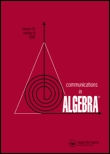
COMMUNICATIONS IN ALGEBRA
Scope & Guideline
Exploring the Frontiers of Algebraic Knowledge.
Introduction
Aims and Scopes
- Algebraic Structures and Their Properties:
Exploration of various algebraic structures such as rings, groups, modules, and algebras, with a focus on their intrinsic properties and interrelations. - Homological Algebra:
Investigation into the relationships between algebraic structures through homological methods, including derived categories, Ext and Tor functors, and projectivity. - Representation Theory:
Study of representations of algebraic structures, particularly finite groups and Lie algebras, and their implications for character theory and module theory. - Noncommutative Algebra:
Research on noncommutative rings, algebras, and their applications, including quantum groups and their representations. - Geometric Aspects of Algebra:
Examination of the interplay between algebra and geometry, especially through the lens of algebraic varieties and schemes. - Applications of Algebraic Concepts:
Utilization of algebraic structures in various mathematical and scientific contexts, including applications in coding theory, combinatorics, and mathematical physics.
Trending and Emerging
- Derived Categories and Triangulated Structures:
There is a marked increase in papers exploring derived categories, triangulated categories, and their applications in algebra, reflecting a growing interest in homological methods. - Noncommutative Geometry and Algebra:
Emerging research in noncommutative geometry and its connections to algebraic structures suggests a burgeoning field that integrates geometric insights with algebraic frameworks. - Algebraic Groups and Their Representations:
A resurgence in studies related to algebraic groups, particularly their representation theory, indicates a renewed interest in the intersection of algebra and geometry. - Computational Algebra:
The rise of computational methods in algebra, including algorithmic approaches to problems in algebraic structures, has become increasingly prominent in recent publications. - Applications to Physics and Other Sciences:
There is a growing trend towards applying algebraic concepts to problems in mathematical physics and other scientific domains, reflecting the interdisciplinary nature of modern algebra.
Declining or Waning
- Classical Group Theory:
Publications focused on classical groups and their properties have decreased, possibly indicating a shift towards more abstract algebraic structures or computational aspects. - Elementary Number Theory:
Research pertaining to elementary number theory within algebra has become less prominent, as the journal gravitates towards more complex algebraic structures and applications. - Traditional Ring Theory:
While ring theory remains a core focus, the exploration of traditional areas such as commutative ring theory has seen a decline, with more emphasis on noncommutative and derived aspects.
Similar Journals

SIAM Journal on Applied Algebra and Geometry
Advancing Mathematical Frontiers through Applied TechniquesSIAM Journal on Applied Algebra and Geometry, published by SIAM Publications, is a premier academic journal that occupies a vital space in the fields of Algebra, Geometry, and Applied Mathematics. With an impressive impact factor reflected in its Q1 category rankings in 2023 across key mathematical disciplines such as Algebra and Number Theory, as well as Geometry and Topology, this journal is positioned among the highest echelons of mathematical research. Since its inception in 2017, it has become a crucial source for advanced studies and applied techniques that harness algebraic and geometric methods, catering to both theoretical insights and practical applications. Researchers, professionals, and students alike benefit from its rigorous peer-reviewed articles that explore contemporary challenges and developments in mathematics. While Open Access options are currently not available, the journal remains dedicated to fostering innovation and knowledge dissemination within the scientific community, thus ensuring significant contributions to the advancement of the mathematical sciences.

MICHIGAN MATHEMATICAL JOURNAL
Unveiling New Perspectives in Mathematics Since 1996The MICHIGAN MATHEMATICAL JOURNAL is a prestigious and influential publication in the field of mathematics, founded by the University of Michigan. With an ISSN of 0026-2285 and an E-ISSN of 1945-2365, this journal is recognized for its high-quality research and has achieved a commendable Q1 ranking in the category of Mathematics (miscellaneous) as of 2023. Published by the esteemed Michigan Mathematical Journal, it provides a platform for the dissemination of innovative mathematical theories and findings, playing a crucial role in advancing knowledge and scholarship within the mathematical community. With coverage spanning from 1996 to 2024, the journal emphasizes rigorous theoretical development and fosters collaboration among researchers, professionals, and students alike. While not an open-access journal, its contributions are invaluable for those looking to stay abreast of cutting-edge mathematical research.

JOURNAL OF LIE THEORY
Illuminating the Path of Lie Theory Discoveries.JOURNAL OF LIE THEORY, published by Heldermann Verlag, is a prominent academic journal that concentrates on theoretical advancements in the realm of Lie theory, encompassing Lie algebras, Lie groups, and their applications across various branches of mathematics. Since its inception, the journal has served as a vital platform for researchers to disseminate innovative findings, contributing significantly to the field's body of knowledge. With a commitment to high-quality scholarship, the journal ranks in the Q3 quartile for Algebra and Number Theory, indicating a respectable standing within its category. Although it is not an open-access journal, the JOURNAL OF LIE THEORY remains accessible to researchers and institutions with subscriptions, fostering collaboration and knowledge exchange among mathematicians. As it continues to publish valuable research from 1996 to 2024, this journal remains a crucial resource for those interested in the intricate relationships and structures defined by Lie theory, ensuring that both seasoned academics and budding scholars can explore and expand upon the discipline's foundational concepts.
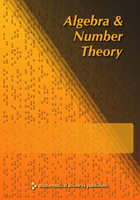
Algebra & Number Theory
Advancing the Frontiers of Algebra and Number TheoryAlgebra & Number Theory, published by Mathematical Science Publications, stands at the forefront of mathematical research, particularly in the fields of algebra and number theory. With an ISSN of 1937-0652 and E-ISSN 1944-7833, this esteemed journal provides a dedicated platform for the dissemination of cutting-edge theoretical advances and practical applications. It has achieved a Q1 category ranking in both algebra and number theory according to the 2023 quartiles, reinforcing its critical role in shaping contemporary mathematical discourse. The journal serves as an essential resource for researchers, professionals, and students alike, offering insights into diverse mathematical methodologies and fostering open dialogue among scholars. Although it does not provide open access, its robust impact factor reflects the high quality and relevance of its published work. Based in the United States at the University of California, Berkeley, the journal's commitment to excellence continues to attract contributions that push the boundaries of mathematical understanding.

New York Journal of Mathematics
Connecting researchers to shape the future of mathematics.New York Journal of Mathematics is a prominent open-access journal, published by the ELECTRONIC JOURNALS PROJECT, dedicated to advancing the field of mathematics through the dissemination of groundbreaking research. Since its inception in 1996, the journal has evolved into a valuable resource for researchers, educators, and students, particularly in the realm of general mathematics. As of 2023, it proudly holds a Q2 classification in the Mathematics (miscellaneous) category, reflecting its growing impact and reach within the academic community, despite being ranked at the 31st percentile overall. With its commitment to open access since 2022, the journal ensures that high-quality mathematical research is readily available to a global audience, fostering collaboration and innovation. Researchers interested in contributing to this dynamic field will find the journal a vital platform for sharing their findings and engaging with fellow mathematicians around the world.

Documenta Mathematica
Unlocking the Potential of Mathematical DiscoveriesDocumenta Mathematica is a premier academic journal published by the European Mathematical Society (EMS), making significant contributions to the field of mathematics since its inception. With an Open Access model established in 1996, the journal ensures that scholarly works are freely available to a global audience, promoting widespread dissemination of mathematical research. Based in Germany, it serves as a vital platform for mathematicians, covering a wide array of topics within the discipline, evidenced by its impressive Q1 ranking in the miscellaneous category of mathematics as of 2023. Featuring rigorous peer-reviewed articles that span the latest trends and breakthroughs in the discipline, Documenta Mathematica also retains a commendable position among its peers with a Scopus rank of 163 out of 399, placing it in the 59th percentile for general mathematics. Researchers, professionals, and students alike will benefit from the robust scholarly content and the journal's commitment to advancing mathematical knowledge.
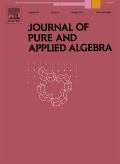
JOURNAL OF PURE AND APPLIED ALGEBRA
Exploring the Depths of Pure and Applied MathematicsJOURNAL OF PURE AND APPLIED ALGEBRA, published by Elsevier, stands as a premier academic platform in the fields of algebra and number theory, boasting a distinguished impact factor that reflects its rigorous peer-review process and influential research contributions. Established in 1971 and continuing its impressive trajectory until 2025, this journal has carved a niche for itself by providing a forum for innovative studies, theoretical advancements, and practical applications within pure and applied algebra. With its prestigious Q1 ranking in Algebra and Number Theory, the journal not only ranks among the top tier in its category but also offers an extensive collection of research that caters to mathematicians, academicians, and students alike. Scholars will find it an invaluable resource for disseminating their findings, as well as keeping abreast of significant developments in the field, further solidifying its role as a cornerstone of mathematical research.

Algebra And Discrete Mathematics
Bridging Classical and Contemporary Mathematical TheoriesAlgebra And Discrete Mathematics, published by LUHANSK TARAS SHEVCHENKO NATIONAL UNIVERSITY, is a pivotal academic journal dedicated to exploring the realms of algebra and discrete mathematics. Since its inception in 2012, this journal has contributed significantly to the mathematical community, catering to researchers, professionals, and students interested in advancing their understanding of both classical and contemporary mathematical theories. With categories placed in Q4 in Algebra and Number Theory and Q3 in Discrete Mathematics and Combinatorics, and rankings that place it among various domains with percentiles reflecting its niche status, the journal offers a platform for innovative and high-quality research. While the journal is currently not open access, it maintains a robust academic presence, and its continuous publication until 2024 ensures a steady stream of scholarly discourse. Researchers and academics keen on disseminating their findings or keeping abreast of the latest developments in these mathematical fields will find valuable insights and diverse methodologies within its pages.
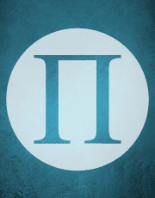
Forum of Mathematics Pi
Advancing Mathematical FrontiersForum of Mathematics Pi, published by Cambridge University Press, stands at the forefront of mathematical research, providing an open-access platform since 2013. With an ISSN of 2050-5086, this journal has rapidly established itself within the mathematical community, particularly noted for its high impact in the realms of Algebra and Number Theory, Analysis, Discrete Mathematics and Combinatorics, Geometry and Topology, Mathematical Physics, and Statistics and Probability, as evidenced by its 2023 Q1 rankings across these categories. Its placement within the top quartile signifies its importance and influence, attracting submissions from leading researchers and academicians around the globe. The journal’s diverse scope and rigorous peer-review process ensure a high standard of scholarly excellence, making it an indispensable resource for professionals, students, and researchers eager to stay informed about cutting-edge mathematical advancements. Access to its comprehensive array of articles is openly available, promoting a culture of collaboration and knowledge sharing in the mathematics community.
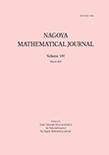
NAGOYA MATHEMATICAL JOURNAL
Pioneering Research for a Global Mathematical CommunityNAGOA MATHEMATICAL JOURNAL, published by Cambridge University Press, is a prestigious journal that has been at the forefront of advancing mathematical scholarship since its inception in 1950. With an ISSN of 0027-7630 and an E-ISSN of 2152-6842, this journal has gained recognition for its high-quality research contributions in the field of mathematics, achieving a Q1 classification in Mathematics (miscellaneous) as of 2023. The journal’s impact is further reflected in its Scopus rank of #164 out of 399 in the General Mathematics category, positioning it within the 59th percentile of its peers. Scholars, researchers, and students can access a range of innovative mathematical studies that explore diverse topics, fostering a vibrant dialogue within the mathematical community. By catering to a global audience, the NAGOYA MATHEMATICAL JOURNAL continues to play a critical role in shaping contemporary mathematical discourse and research.